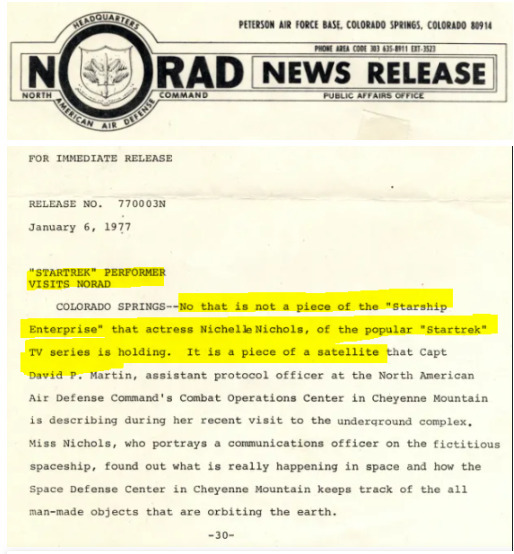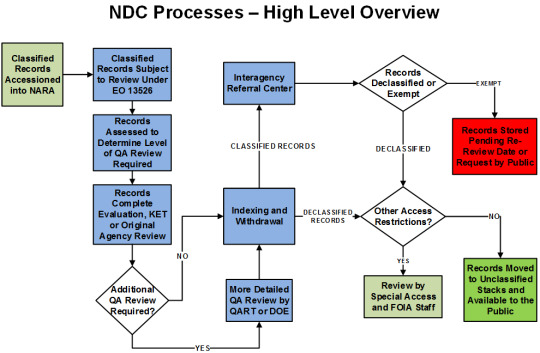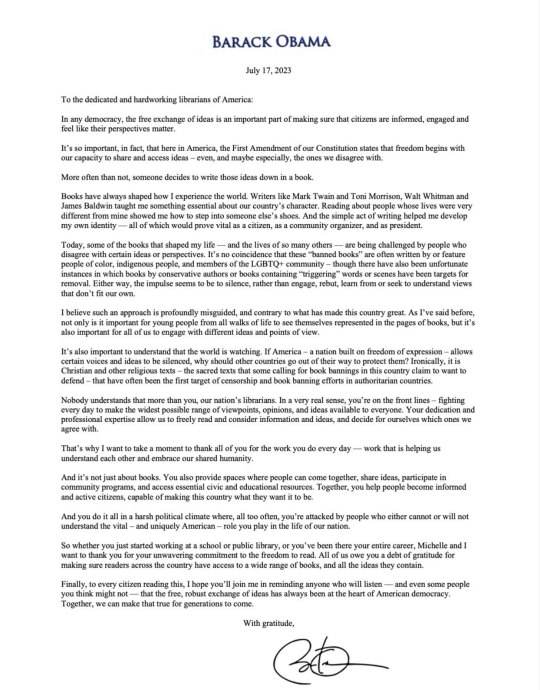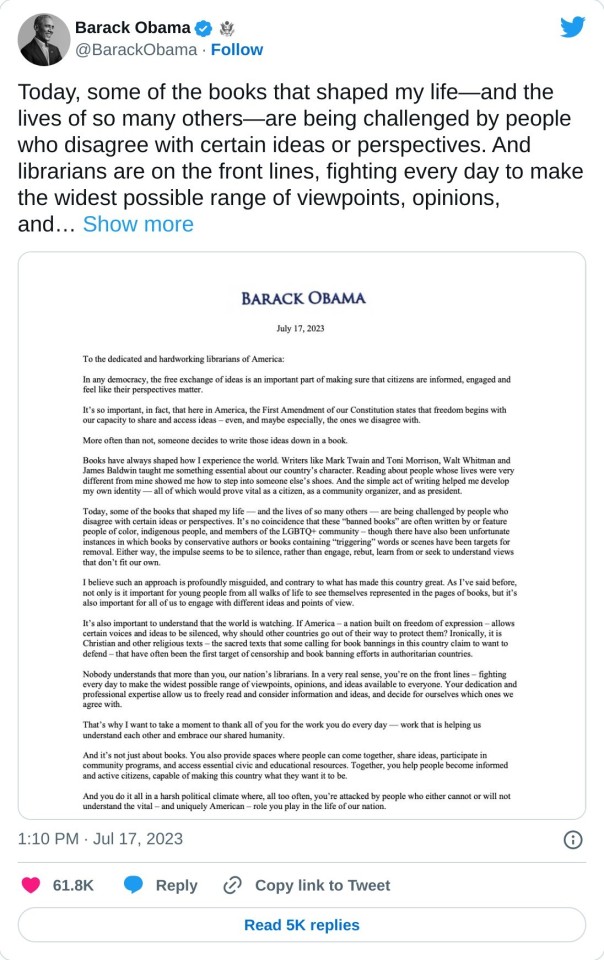#obama library
Text

Oval Office Vulcan salute - President Obama and Nichelle Nichols. Photo by Pete Souza. Obama Library, NARA ID 200283671.

Nichelle Nichols at NASA's Glenn Research Center, 4/20/1977, NARA ID 17468123.
#RIP Nichelle Nichols
Star Trek's Lt. Uhura goes to the final frontier
By Miriam Kleiman, Public Affairs
youtube
Nichelle Nichols - NASA Recruitment Film 1977.
“Last night, my mother, Nichelle Nichols, succumbed to natural causes and passed away. Her light however, like the ancient galaxies now being seen for the first time, will remain for us and future generations to enjoy, learn from, and draw inspiration. Hers was a life well lived and as such a model for us all." Statement from Nichols’ son, Kyle Johnson

Nichols with adoring fans at NASA's Glenn Research Center, 4/20/1977, NARA ID 17468124 .

Nichelle Nichols holds a piece of a satellite presented by Capt. David Martin at NORAD, 1/6/1977, RG 342. Online here.

NORAD press release 1/6/1977, RG 342, Records of US Air Force, online.
More online:
In Memoriam: Nichelle Nichols (1932-2022), National Archives News.
To Boldly Go Where No (Wo)Man Has Gone Before… by Archives Specialist Netisha Currie.
Nichelle Nichols Helped NASA Break Boundaries on Earth and in Space, NASA.gov
Mae Carol Jemison- The First African American Woman in Space, Pieces of History by Dena Lombardo.
Space Exploration - NASA Records at the National Archives
#nasa#stem#blm#representation matters#star trek#i love star trek#women in stem#black women in stem#rip nichelle#rip nichelle nichols#obama#obama library#rip#black women rock#black history#african american history#rediscoveringblackhistory#norad#greatwomen#nichelle nichols
3K notes
·
View notes
Text
Archivists on the Issues: Classified Records, Archives, and Fictional Depictions [Part 1]
Archivists on the Issues is a forum for archivists to discuss the issues we are facing today. Today’s post comes from Burkely Hermann (me), Metadata Librarian for the National Security Archive and current I&A Blog Coordinator. There will be spoilers for each of the books, animated series, films, and other media he will be discussing. This was originally published on February 7, 2023 on the Issues & Advocacy WordPress blog.

High-level overview of National Declassification Center processes, as shown in a post on the NDC blog in 2019
Previously on this blog, Rachel Mattson examined whether police body camera footage is public record or is classified, arguing that it should be a public record. Other blogposts on this blog have examined whether the Senate Intelligence Committee Report on Torture is a Federal or Congressional Record, noted selective declassification by the French government, which declassified over 200,000 records about Vichy government’s collaboration with the Nazis but none about France's occupation of Algeria, and noted the tendency of politicians to avoid documenting their activities and stonewall FOIA requests.
In January 2022, the Director of National Intelligence April Haines argued, in a letter to U.S. Senators Ron Wyden and Jerry Moran that there are "deficiencies" in the current declassification system, and notes the burden of mandatory declassification requirements while the amount of classified material expands. My colleague from National Security Archive, Lauren Harper, noted that Haines, many months later, said that overclassification is a national security threat. Some of these classified records are in the hands of the National Archives, otherwise known as the National Archives and Records Administration (NARA), organized into Top Secret, Secret, and Confidential. Other records are deemed unclassified if they do not meet the existing requirements for classification.
Classification of records in the U.S. has often been outlined in presidential executive orders, beginning with President Truman in 1951. National security generally described as the primary reason for classification. Over the years, rules changed and the role of NARA increased. This has even resulted in a part of the agency dedicated to declassification, the National Declassification Center (NDC), which was established in 2009, in accordance with Executive Order 13526. This went beyond the agency's representation on the Interagency Security Classification Appeals Panel (ISCAP), or the Information Security Oversight Office (ISOO), which oversees the security classification programs in "both Government and industry", and reports to the President annually. The ISOO, role on ISCAP, and NDC, most recently, have given NARA an important position in the entire classified information management process. [1]
Unsurprisingly, NARA has been in the public focus, especially for storing presidential records from the Obama Administration, and afterward. Some politicians have claimed the agency is an "enemy" and have wanted to dismantle it because of NARA's push to return classified records to the public, rather than having the records stored in shoddy locations or controlled by presidents as their personal property. [2] This makes reports, in past years, like in May 2012, that boxes of classified government records disappeared from Washington National Records Center all the more concerning, as it could be representative of a larger trend.
Currently, there are measures in place for declassification of government records, either enshrined in executive orders or provisions of the Freedom of Information Act (FOIA). However, the FOIA system is currently flawed, especially with existence of various exemptions which can be used to redact documents or reject records requests. [3] There are similar issues with Mandatory Declassification Review (MDR) requests. As one government report put it, storage of classified materials is "widespread" across the U.S. government, with NARA storing records from all agencies at central facilities. Even so, some have argued that politicians have neglected the National Archives and failed to "control official secrecy", belaying assumptions about government transparency, and resulting in the crisis which will make it harder for researchers to examine the "state’s inner workings". Recent developments, such as a drop in the annual budget of NARA, attrition, and loss of institutional memory have resulted in the agency having one of the lowest levels of job satisfaction in the federal government. All the while, funding for declassification has decreased and backlogs for declassification have increased. [4]
NARA is not the only archives which handles and processes classified records. There are established procedures for classification of records held by the New South Wales Archives in Australia, British Public Record Office, Taiwanese government, Israeli Defense Force, State Archives of Poland, National Archives of Brazil, South African State Archives Service (later renamed National Archives and Records Service), National Archives of Korea, and National Archives of France. Even the archives of the United Nations has a classification level of Strictly Confidential, necessitating declassification requests, while archival materials over 20 years old are "generally open to the public for research". [5]
As Electronic Records Archivist Amy Wickner argued, archivists have the "power to name and classify," a power which has "material effects on the world". This power can be used to make records more accessible or to make them harder to access. The latter is the case if access is only "granted or refused on an individual basis". At times, more restrictions are imposed because of compliance with professional standards or data within in a record rather than the document itself. This includes including personal data. On the other hand, records which should be publicly available, like agreements between carceral facilities and FamilySearch for indexing of historical records, have a possibility of redaction, despite the lack of personal or sensitive information. [6]
© 2022-2023 Burkely Hermann. All rights reserved.
Continued in part 2
Notes
[1] Čtvrtník, Mikuláš. "Classified records and the archives." Archival Science 22 (2022): https://doi.org/10.1007/s10502-021-09370-3.
[2] O'Rourke, Ciara. "Claims about Obama Foundation keeping classified records in an abandoned warehouse are wrong." Poynter, Oct. 7, 2022; Caputo, Marc. "Barr suggests Trump 'deceived' the government over classified records." NBC News, Sept. 2, 2022; Suebsaeng, Asawin and Adam Rawnsley. "Trump Tells His Lawyers: Get ‘My’ Top Secret Documents Back." Rolling Stone, Aug. 23, 2022; Alemany, Jacqueline, Isaac Arnsdorf, and Josh Dawsey. "Inside Trump’s war on the National Archives." Washington Post, Aug. 27, 2022; Legare, Robert. "Archives found 100+ documents with classified marking in first 15 Trump boxes." Yahoo! News, CBS News. Aug. 23, 2022; Kochi, Sudiksha. "Fact check: Archives agency transferred 30 million unclassified Obama records to Chicago." USA Today, Oct. 3, 2022; Derysh, Igor. "'He has the right to remain silent': Legal experts say Trump’s Truth Social post may be 'evidence'." Salon, Nov. 29, 2022; "Press Statements in Response to Media Queries About Presidential Records." National Archives and Records Administration, Nov. 9, 2022; Reilly, Steve. "What the government’s former top classified records overseer sees in the Mar-a-Lago search." Grid, Aug. 10, 2022; Wood, Jennifer. "Donald Trump Just Couldn’t Keep His Mouth Shut And Went Ahead And Confessed: ‘I Did’ Steal Classified Documents From The White House." Uproxx, Nov. 29, 2022; "Fact Check-National Archives and Records Administration says they manage all of Obama’s Presidential records, contrary to claims online." Reuters, Sept. 30, 2022. There have also been cases, like a lawsuit by the conservative legal group, Judicial Watch, against NARA, aiming to declassify Clinton Administration efforts, but their efforts were dismissed by the courts.
[3] "Freedom of Information Act flaws need fixing, experts say." American Bar Association, Aug. 4, 2018; "The media’s problems with FOIA." Reporter's Committee for Freedom of the Press, Winter 2007; Goos, Christian. "Seeking Access to Classified Records: Requesting Mandatory Declassification Review (MDR) versus Freedom of Information Act (FOIA)." ISOO Overview, Oct. 1, 2021.Also of note are pages like the "Overview" webpage on the Records Management Directorate and Army Declassification Directorate, the NSA's page on supposed declassification/transparency initiatives, and a press release about ZL Tech's support of a "records management platform with DOD classified technology".
[4] "Appendix V: Central Storage, Declassification and Destruction" in Classified Information: Costs of Protection are Integrated with Other Security Costs: Report to the Chairman, Information, Justice, Transportation, and Agriculture Subcommittee, Committee on Government Operations, House of Representatives (United States General Accounting Office, 1993), 26; Connelly, Matthew. "State Secrecy, Archival Negligence, and the End of History as We Know It." Knight First Amendment Institute, Sept. 21, 2018. The latter article also says that state secrecy and state archiving began at the same time, around the establishment of NARA and into World War II.
[5] "Standard on the physical storage of State records." New South Wales Archives in Australia, Feb. 2019; Wittner, Laurence. "What I Learned About Governments from Researching Classified Documents." History News Network, Sept. 4, 2022; "The Management Regulations for Classified Archives." Law & Regulations Database of the Republic of China (Taiwan), May 10, 2005; Peterson, Terrence. "The French Archives and the Coming Fight for Declassification." War on the Rocks, Mar. 6, 2020; Makleff, Ron. "Sovereignty and Silence: The Creation of a Myth of Archival Destruction, Liège, 1408." Archive Journal, Aug. 2017; "Public Reference Services." United Nations Archives and Records Management Section, accessed Dec. 5, 2022; Franco, Shirley. "Transparência e opacidade do estado no Brasil: Usos e desusos da informação governamental." The American Archivist 84, no. 1 (2021): 196; Sromek, Teresa. "Teoria i praktyka archiwistyki USA." The American Archivist 83, no. 1 (2020): 177; Harris, Verne and Christopher Merrett. "Toward a Culture of Transparency: Public Rights of Access to Official Records in South Africa." The American Archivist 57, no. 4 (1994): 681-2, 684, 688, 691; Lee, Kyong. "Political Democracy and Archival Development in the Management of Presidential Records in the Republic of Korea." The American Archivist 69, no. 1 (2006): 119-120,129, 134-135, 137-138.
[6] Wickner, Amy. "Recognizing Co-Creators in Four Configurations: Critical Questions for Web Archiving." Journal of Contemporary Archival Studies 8 (2019): 4; Geraci, Noah and Michelle Caswell. "Developing a Typology of Human Rights Records." Journal of Contemporary Archival Studies 3 (2016): 18; Taylor, Claire, Lucia Brandi, Cecilia A. Acosta Sánchez, and Marcelo Díaz Vallejo, "Archives of Human Rights and Historical Memory: An Analysis of Archival Practices ‘From Below’ in Four NGOs in Colombia Archival Practices ‘From Below’ in Four NGOs in Colombia." Journal of Contemporary Archival Studies 8 (2021): 11, 16; Rinn, Meghan R. "Review of The Future of Literary Archives." Journal of Contemporary Archival Studies 7 (2020): 4; Szekely, Ivan. "Do Archives Have a Future in the Digital Age?" Journal of Contemporary Archival Studies 4 (2017): 4; Jansson, Jenny, Katrin Uba, Jaanus Karo, "Labor Gone Digital (DigiFacket)! Experiences from Creating a Web Archive for Swedish Trade UnionsArchive for Swedish Trade Unions." Journal of Contemporary Archival Studies 7 (2020): 5; Windon, Katrina and Lydia M. Tang. "Archival discretion: a survey on the theory and practice of archival restrictions." Journal of Contemporary Archival Studies 9 (2022): 8.
#archival science#archival studies#archives#familysearch#genealogy#classification#classified records#declassified#nara#national archives#foia#freedom of information#mdr requests#president truman#prisons#records center#obama library#trump library#anti trump
1 note
·
View note
Text


354 notes
·
View notes
Text

Here's a letter by President Barack Obama that was published on his Twitter account today that expresses the importance of and appreciation for librarians!

#librarians#censorship#support libraries#support librarians#President Barack Obama#banned books#banned and challenged books
79 notes
·
View notes
Text
LCPL Wrapped: 2023
We waited until the very last moment of 2023 to gather our numbers, and now here they are! The most checked-out books of 2023!

Want to compare to 2022? Here's 2022 wrapped.
(Images are lists of books; each list is typed out in the post under the image.)


Top Adult Fiction:
Welcome back returning champ Jodi Picoult!
1: Mad Honey by Jodi Picoult and Jennifer Finney Boylan
2: It Starts With Us by Colleen Hoover
3: The House of Wolves by James Patterson and Mike Lupica
4: Identity by Nora Roberts
5: Without a Trace by Danielle Steel
Top Adult Nonfiction:
Novelty is the name of the game; none of these titles were on last year's list!
1: Spare by Prince Harry
2: Friends, Lovers, and the Big Terrible Thing by Matthew Perry
3: I'm Glad My Mom Died by Jenette McCurdy
4: The Light We Carry by Michelle Obama
5: Killers of the Flower Moon by David Grann
Top YA, Kids', and ebooks/audiobooks under the Read More ⬇️ Hit that jump to see where Suzanne Collins ended up this year, and find out which author walked away with an ENTIRE category!

Top Adult eBooks and eAudiobooks:
Welcome back returning champ Colleen Hoover!
1: It Starts With Us by Colleen Hoover
2: Verity by Colleen Hoover
3: It Ends With Us by Colleen Hoover
4: Happy Place by Emily Henry
5: Lessons in Chemistry by Bonnie Garmus


Top YA Print Books:
Suzanne Collins pulls into 1st and 2nd place over last year's 2nd and 3rd while Jenny Han holds steady at 5th!
1: The Hunger Games by Suzanne Collins
2: The Ballad of Songbirds and Snakes by Suzanne Collins
3: Harry Potter and the Sorcerer's Stone by J.K. Rowling
4: Mockingjay by Suzanne Collins
5: The Summer I Turned Pretty by Jenny Han
Top YA eBooks and eAudiobooks:
Welcome back returning champ Jenny Han!
1: The Summer I Turned Pretty by Jenny Han
2: The Ballad of Songbirds and Snakes by Suzanne Collins
3: A Good Girl's Guide to Murder by Holly Jackson
4: If He Had Been With Me by Laura Nowlin
5: It's Not Summer Without You by Jenny Han


Top Kids' Print Books:
AKA We Hope You're Pleased With Yourself, Mr. Kinney
1: Diper Överlöde by Jeff Kinney
2: Rowley Jefferson's Awesome Friendly Spooky Stories by Jeff Kinney
3: Big Shot by Jeff Kinney
4: Rowley Jefferson's Awesome Friendly Adventure by Jeff Kinney
5: Rodrick Rules by Jeff Kinney
Top Kids' eBooks and eAudiobooks:
Jeff Kinney's The Deep End pulls into 1st from last year's 4th!
1: The Deep End by Jeff Kinney
2: Mary Anne's Bad Luck Mystery by Ann M. Martin
3: Harry Potter and the Sorcerer's Stone by J.K. Rowling
4: Diper Överlöde by Jeff Kinney
5: Twenty Thousand Fleas Under the Sea by Dav Pilkey
#public libraries#wrapped 2023#books and reading#library life#popular books#bookblr#books#books & libraries#suzanne collins#colleen hoover#the ballad of songbirds and snakes#the hunger games#jodi picoult#prince harry#michelle obama#young adult books#kids books#kids' books#LCPLWrapped#LCPL recs
13 notes
·
View notes
Note
Will all the presidents who are still alive right now be buried at their presidential libraries when they die?
John F. Kennedy is buried at Arlington National Cemetery and Lyndon B. Johnson is buried in a family graveyard near the LBJ Ranch, but every other President since Herbert Hoover has been buried on the grounds of their Presidential Library or Museum (Gerald Ford's Presidential Library and Presidential Museum are in separate locations and he's buried at his Museum), so that's the most likely scenario for the Presidents who are still living today.
Jimmy Carter will be buried in the yard of his longtime home in Plains, Georgia (which is a National Historic Site) instead of his Presidential Library in Atlanta.
Bill Clinton will be buried on the grounds of his Presidential Library in Little Rock, Arkansas. This is actually where Clinton's grave will eventually be located:

For many years, George W. Bush was going to be buried at the Texas State Cemetery in Austin and he and former First Lady Laura Bush had even chosen their plot already. However, following the death of Bush's mother in 2018 and her burial at the George H.W. Bush Presidential Library in College Station, Texas, the former President and his wife decided that they will eventually be laid to rest at the George W. Bush Presidential Library, located at Southern Methodist University in Dallas.
We don't know where Barack Obama or Donald Trump will be buried. Obama is building his Presidential Center in Chicago, but it is apparently against the law for people to be buried anywhere other than cemeteries in Chicago.
President Biden also has not revealed any plans about where he will eventually be buried. However, nearly all of President Biden's immediate family members have been buried at the parish cemetery of St. Joseph on the Brandywine Catholic Church near Wilmington, Delaware, including Biden's parents, his first wife Neilia and infant daughter Naomi (who were killed in car accident in 1972), as well as his beloved son, Beau, who died of brain cancer in 2015. Considering how tight-knit Biden's family has been, I would not be surprised if that will someday also be the President's final resting place.
#Presidents#Presidential Graves#Presidential Gravesites#Presidential Burials#Presidential Burial Sites#Presidential Funerals#Presidential Deaths#Presidential Libraries#History#Jimmy Carter#President Carter#Bill Clinton#President Clinton#George W. Bush#Bush 43#President Bush#Barack Obama#President Obama#Donald Trump#President Trump#Joe Biden#President Biden
36 notes
·
View notes
Photo

Barack Obama Recommends: 6 Notable Picks to Add to Your TBR
[via Off the Shelf]
No summer is complete without an annual reading list from former President Barack Obama. We’re so excited that he’s back again to provide his stellar book recs for summer reading—and we quite agree with his picks.
The School for Good Mothers by Jessamine Chan
Velvet Was the Night by Silvia Moreno-Garcia
Mouth to Mouth by Antoine Wilson
The Candy House by Jennifer Egan
The Family Chao by Lan Samantha Chang
Black Cake by Charmaine Wilkerson
10 notes
·
View notes
Link
2 notes
·
View notes
Text

Ruby Bridges escorted to school by U.S. Marshals, 11/4/1960. NARA ID 175539851.
#OTD: Ruby Bridges Makes History
A small step for a little girl, a great step for Civil Rights
By Miriam Kleiman, Public Affairs
On November 14, 1960, six-year-old Ruby Bridges changed history when she walked into William Franz Public School in New Orleans following the court-ordered desegregation of New Orleans schools.
Fifty years later, President Obama welcomed her to the White House to see Norman Rockwell’s painting of her historic first day. "The Problem We All Live With” (1963) was displayed in the West Wing in summer 2011. See the Obama White House blog: President Obama Meets Civil Rights Icon Ruby Bridges, preserved by the Obama Library.

President Obama and Ruby Bridges at the White House, 7/15/2011. NARA ID 219775135.
Video: President Obama and Ruby Bridges at the White House!
youtube
See related:
Executive Order 10730: Desegregation of Central High School (1957)
Federal Records Relating to the Brown v. Board, ReDiscovering Black History blog by Tina Ligon
Teaching with Documents: Brown v. Board
Teaching with Documents: Bios of Key Figures in Brown v. Board
Eisenhower Library: Civil Rights: Brown v, Board
#ruby bridges#civil rights#obama library#black women#desegregation#blm#black lives matter#black history#new orleans#norman rockwell#rubybridgesfoundation
440 notes
·
View notes
Text

#barack obama#book quote#library love#books#booklr#booksareawesome#reading#hpl#reading is awesome#hammond public library#we love our library
5 notes
·
View notes
Text
can someone please help me remember how tf to use this gd app
#new tumblr#new tumblog#new account#tears of the kingdom#70s style#books and libraries#us politics#fuck the us#fuck israel#from the river to the sea palestine will be free#fuck the idf#fuck obama#fuck biden#fuck bernie#fuck the entire mid to right side of the spectrum#fuck the lesser evil#idk#how to make friends#or#how to find followers and people to follow#if you need a friend lmk#my sphere here rn is zero
0 notes
Text
Thank You to America’s Librarians for Protecting Our Freedom to Read
Thank You to America’s Librarians for Protecting Our Freedom to Read https://barackobama.medium.com/thank-you-to-americas-librarians-for-protecting-our-freedom-to-read-80ce373608b3
#librarian#censorship#libraries#support libraries#banned books#book banning#intellectual freedom#librarians#president obama#public libraries#school libraries
0 notes
Note
Where do you think Biden is likely to have his Museum? I presume Wilmington. Do you think that like Obama he will have his Library digitised?
Biden represented Delaware for so long that I think he'd definitely want to put his Presidential Library in Wilmington. But most Presidential Libraries usually have ties to universities and Biden set up his post-Vice Presidential think tank at the University of Pennsylvania, so it wouldn't be a shock if he had it in Philly. And, of course, he loves reminding everybody that he was born in Scranton, so maybe he'll team up with Dunder Mifflin.
I think Biden's library will probably be more traditional than Obama's, but by the time Biden starts putting his deal together maybe the Obama Library will pave the way for new ideas about Presidential Archives. Maybe I'm just old-school, but I love the idea of the Presidential Libraries where you can go in and sift through the actual papers of the Administrations. There's something so cool about walking into the @lbjlibrary's atrium and seeing the wall of boxes of archived papers on the floors above you:

#Presidential Libraries#Joe Biden#President Biden#Biden Presidential Library#Obama Presidential Center#Barack Obama#President Obama#LBJ Library#Lyndon B. Johnson
16 notes
·
View notes
Text
with twitter imploding, people are talking about how much it'll suck to have celebrities and brands on here, but...I think celebrities can exist on tumblr in a healthy way.
because I've already seen it happen.
I don't know if you guys remember, but there used to be a decent number of celebrities on here! I mean, the white house had an official tumblr! so did my local library for some reason! everyone thought tumblr was the place to be!
we had George Takei, Taylor Swift, Lady Gaga, Hayley Williams, Ariana Grande, Dylan Marron, Dante Basco, Rebecca Sugar, John Green, Hannah Hart, Jacksfilms, Daniel Howell, and Ashens to name a few, as well as brand accounts for Doctor Who, Sherlock, Denny's, and so many others.
(Cole Sprouse was even on here, and it was fine. don't act like it wasn't. it was really not a big deal! it was fine!)
there were plenty of celebrities and brands on tumblr a decade ago - and it worked fine when people knew to stay in their lane!
did Obama's official account give a shit when people posted Obamney slash? absolutely not!
did we pay attention to whatever the brand accounts were posting? we did not!
and so we existed pretty well together on this site - because, after all, we don't have to look at anything we don't want to. we can block people. and they can block us. and we can keep posting what we want, no matter what any celebs or brands have to say about it, just like it's always been.
the only thing I think needs to change is, well...hey...remember how I mentioned John Green and Rebecca Sugar up there?
yeah the reason we don't see them on here anymore isn't because tumblr isn't a place they'd thrive - it's because a bunch of assholes harassed them until they left.
and that's not fucking okay.
so look, if you see celebs/brands on here, follow them, or don't! block them and ignore them, or don't!
but if you send threats and harassment to anyone on here, whether it be a celebrity, brand, or average tumblr user, you are the asshole. full stop. sending threats to other people is never okay. never.
and yes, this goes for the corporate accounts too! those are still run by people!
it's somebody's job to run those accounts, and guess what! that poor, probably-underpaid person doesn't deserve to get sent gore and death threats because their job is running a corporate tumblr account!
just, whatever happens when twitter explodes and dies a horrible death, it's gonna be okay. but please be kind. above everything else, please, I am fucking begging you, be kind.
it's really the most important part of thriving here
#that and knowing when to ignore the discourse#tumblr#personal#this is a bit much#but like#look#I don't really care about celebrities and brands being on here#if they stay out of fandom tags and don't break the fourth wall#(the wall between fandom and creators)#and don't interact with the fic and ships and such#go for it#go nuts show nuts etc#but the same goes for us#we have to be kind#we have to block and ignore instead of sending threats#otherwise we are worse than the brand accounts and I mean that#oh#william shatner#I forgot#he was on here too#and lucy hale#from pretty little liars#she was here#trying to think of other celeb/brand accounts#hmmm#her interactive (rip) had an official tumblr
7K notes
·
View notes
Text
'We buy ugly houses' is code for 'we steal vulnerable peoples' homes'

Tonight (May 11) at 7PM, I’m in CALGARY for Wordfest, with my novel Red Team Blues; I’ll be hosted by Peter Hemminger at the Memorial Park Library, 2nd Floor.

Home ownership is the American dream: not only do you get a place to live, free from the high-handed dictates of a landlord, but you also get an asset that appreciates, building intergenerational wealth while you sleep — literally.
If you’d like an essay-formatted version of this post to read or share, here’s a link to it on pluralistic.net, my surveillance-free, ad-free, tracker-free blog:
https://pluralistic.net/2023/05/11/ugly-houses-ugly-truth/#homevestor
Of course, you can’t have it both ways. If your house is an asset you use to cover falling wages, rising health care costs, spiraling college tuition and paper-thin support for eldercare, then it can’t be a place you live. It’s gonna be an asset you sell — or at the very least, borrow so heavily against that you are in constant risk of losing it.
This is the contradiction at the heart of the American dream: when America turned its back on organized labor as an engine for creating prosperity and embraced property speculation, it set itself on the road to serfdom — a world where the roof over your head is also your piggy bank, destined to be smashed open to cover the rising costs that an organized labor movement would have fought:
https://gen.medium.com/the-rents-too-damned-high-520f958d5ec5
Today, we’re hit the end of the road for the post-war (unevenly, racially segregated) shared prosperity that made it seem, briefly, that everyone could get rich by owning a house, living in it, then selling it to everybody else. Now that the game is ending, the winners are cashing in their chips:
https://doctorow.medium.com/the-end-of-the-road-to-serfdom-bfad6f3b35a9
The big con of home ownership is proceeding smartly on schedulee. First, you let the mark win a little, so they go all in on the scam. Then you take it all back. Obama’s tolerance of bank sleze after the Great Financial Crisis kicked off the modern era of corporations and grifters stealing Americans’ out from under them, forging deeds in robosigning mills:
https://www.marketwatch.com/story/us-breaks-down-93-bln-robo-signing-settlement-2013-02-28
The thefts never stopped. Today on Propublica, by Anjeanette Damon, Byard Duncan and Mollie Simon bring a horrifying, brilliantly reported account of the rampant, bottomless scams of Homevestors, AKA We Buy Ugly Houses, AKA “the #1 homebuyer in the USA”:
https://www.propublica.org/article/ugly-truth-behind-we-buy-ugly-houses
Homevestors — an army of the hedge fund Bayview Asset Management — claims a public mission: to bail out homeowners sitting on unsellable houses with all-cash deals. The company’s franchisees — 1,150 of them in 48 states — then sprinkle pixie dust and secret sauce on these “ugly houses” and sell them at a profit.
But Propublica’s investigation — which relied on whistleblowers, company veterans, court records and interviews with victims — tells a very different story. The Homevestor they discovered is a predator that steals houses out from under elderly people, disabled people, people struggling with mental illness and other vulnerable people. It’s a company whose agents have a powerful, well-polished playbook that stops family members from halting the transfers the company’s high-pressure salespeople set in motion.
Propublica reveals homeowners with advanced dementia who signed their shaky signatures to transfers that same their homes sold out from under them for a fraction of their market value. They show how Homevestor targets neighborhoods struck by hurricanes, or whose owners are recently divorced, or sick. One whistleblower tells of how the company uses the surveillance advertising industry to locate elderly people who’ve broken a hip: “a 60-day countdown to death — and, possibly, a deal.” The company’s mobile ads are geofenced to target people near hospitals and rehab hospitals, in hopes of finding desperate sellers who need to liquidate homes so that Medicaid will cover their medical expenses.
The sales pitches are relentless. One of Homevestor’s targets was a Texas woman whose father had recently been murdered. As she grieved, they blanketed her in pitches to sell her father’s house until “checking her mail became a traumatic experience.”
Real-estate brokers are bound by strict regulations, but not house flippers like Homevestors. Likewise, salespeople who pitch other high-ticket items, from securities to plane tickets — are required to offer buyers a cooling-off period during which they can reconsider their purchases. By contrast, Homevestors’ franchisees are well-versed in “muddying the title” to houses after the contract is signed, filing paperwork that makes it all but impossible for sellers to withdraw from the sale.
This produces a litany of ghastly horror-stories: homeowners who end up living in their trucks after they were pressured into a lowball sales; sellers who end up dying in hospital beds haunted by the trick that cost them their homes. One woman who struggled with hoarding was tricked into selling her house by false claims that the city would evict her because of her hoarding. A widow was tricked into signing away the deed to her late husband’s house by the lie that she could do so despite not being on the deed. One seller was tricked into signing a document he believed to be a home equity loan application, only to discover he had sold his house at a huge discount on its market value. An Arizona woman was tricked into selling her dead mother’s house through the lie that the house would have to be torn down and the lot redeveloped; the Homevestor franchisee then flipped the house for 5,500% of the sale-price.
The company vigorously denies these claims. They say that most people who do business with Homevestors are happy with the outcome; in support of this claim, they cite internal surveys of their own customers that produce a 96% approval rating.
When confronted with the specifics, the company blamed rogue franchisees. But Propublica obtained training materials and other internal documents that show that the problem is widespread and endemic to Homevestors’ business. Propublica discovered that at least eight franchisees who engaged in conduct the company said it “didn’t tolerate” had been awarded prizes by the company for their business acumen.
Franchisees are on the hook for massive recurring fees and face constant pressure from corporate auditors to close sales. To make those sales, franchisees turn to Homevana’s training materials, which are rife with predatory tactics. One document counsels franchisees that “pain is always a form of motivation.” What kind of pain? Lost jobs, looming foreclosure or a child in need of surgery.
A former franchisee explained how this is put into practice in the field: he encountered a seller who needed to sell quickly so he could join his dying mother who had just entered a hospice 1,400 miles away. The seller didn’t want to sell the house; they wanted to “get to Colorado to see their dying mother.”
These same training materials warn franchisees that they must not deal with sellers who are “subject to a guardianship or has a mental capacity that is diminished to the point that the person does not understand the value of the property,” but Propublica’s investigation discovered “a pattern of disregard” for this rule. For example, there was the 2020 incident in which a 78-year-old Atlanta man sold his house to a Homevestors franchisee for half its sale price. The seller was later shown to be “unable to write a sentence or name the year, season, date or month.”
The company tried to pin the blame for all this on bad eggs among its franchisees. But Propublica found that some of the company’s most egregious offenders were celebrated and tolerated before and after they were convicted of felonies related to their conduct on behalf of the company. For example, Hi-Land Properties is a five-time winner of Homevestors’ National Franchise of the Year prize. The owner was praised by the CEO as “loyal, hardworking franchisee who has well represented our national brand, best practices and values.”
This same franchisee had “filed two dozen breach of contract lawsuits since 2016 and clouded titles on more than 300 properties by recording notices of a sales contract.” Hi-Land “sued an elderly man so incapacitated by illness he couldn’t leave his house.”
Another franchisee, Patriot Holdings, uses the courts aggressively to stop families of vulnerable people from canceling deals their relatives signed. Patriot Holdings’ co-owner, Cory Evans, eventually pleaded guilty to to two felonies, attempted grand theft of real property. He had to drop his lawsuits against buyers, and make restitution.
According to Homevestors’ internal policies, Patriot’s franchise should have been canceled. But Homevestors allowed Patriot to stay in business after Cory Evans took his name off the business, leaving his brothers and other partners to run it. Nominally, Cory Evans was out of the picture, but well after that date, internal Homevestors included Evans in an award it gave to Patriot, commemorating its sales (Homevestors claims this was an error).
Propublica’s reporters sought comment from Homevestors and its franchisees about this story. The company hired “a former FBI spokesperson who specializes in ‘crisis and special situations’ and ‘reputation management’ and funnelled future questions through him.”
Internally, company leadership scrambled to control the news. The company convened a webinar in April with all 1,150 franchisees to lay out its strategy. Company CEO David Hicks explained the company’s plan to “bury” the Propublica article with “‘strategic ad buys on social and web pages’ and ‘SEO content to minimize visibility.’”
https://www.propublica.org/article/homevestors-aims-to-bury-propublica-reporting
Franchisees were warned not to click links to the story because they “might improve its internet search ranking.”
Even as the company sought to “bury” the story and stonewalled Propublica, they cleaned house, instituting new procedures and taking action against franchisees identified in Propublica’s article. “Clouding titles” is now prohibited. Suing sellers for breach of contract is “discouraged.” Deals with seniors “should always involve family, attorneys or other guardians.”
During the webinar, franchisees “pushed back on the changes, claiming they could hurt business.”
If you’ve had experience with hard-sell house-flippers, Propublica wants to know: “If you’ve had experience with a company or buyer promising fast cash for homes, our reporting team wants to hear about it.”


Catch me on tour with Red Team Blues in Calgary, Toronto, DC, Gaithersburg, Oxford, Hay, Manchester, Nottingham, London, and Berlin!

[Image ID: A Depression-era photo of a dour widow standing in front of a dilapidated cabin. Next to her is Ug, the caveman mascot for Homevestors, smiling and pointing at her. Behind her is a 'We buy ugly houses' sign.

Image:
Homevestors
https://www.homevestors.com/
Fair use:
https://www.eff.org/issues/intellectual-property
#pluralistic#the rents too damned high#house flipping#llc brain#scams#elder abuse#ripoffs#weaponized shelter#predators#homevestors#we buy ugly houses#ugly houses#real estate#propublica
2K notes
·
View notes